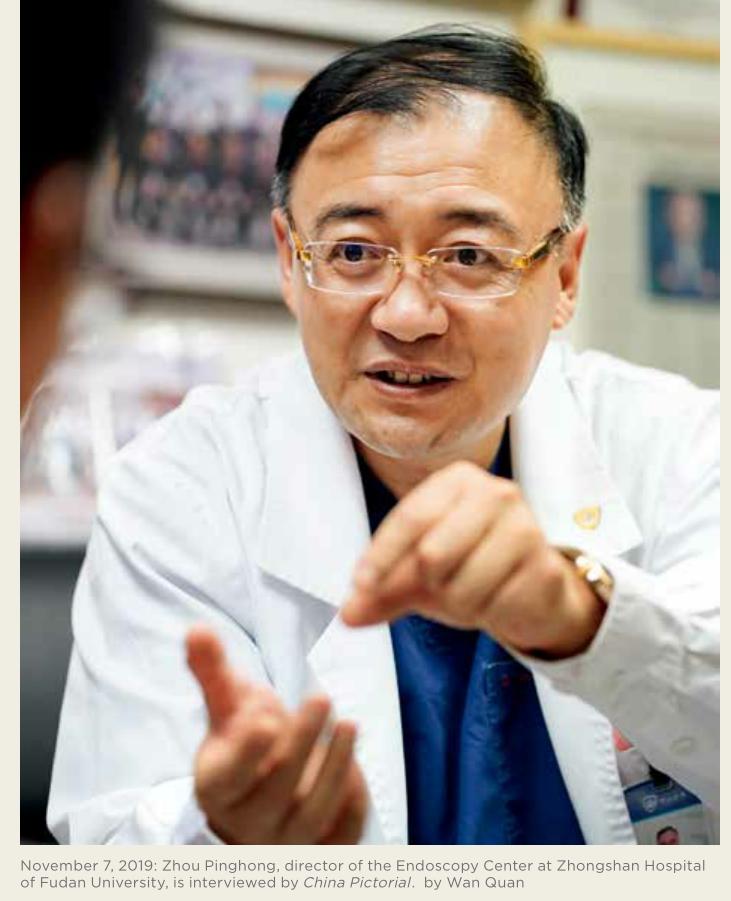The Masterful Doctor
2020-02-10byZhouXin
by Zhou Xin

In the operating room of the Endoscopy Center at Zhongshan Hospital of Fudan University, several minimally invasive surgeries can be performed simultaneously. The cardiographs and endoscopy workstations create a sort of chorus of beeps.
Among the procedures on that day, one surgery was rather unique. Beside the doctor conducting the surgery were two foreign doctors watching closely and asking occasional questions. Another Chinese doctor standing near them answered immediately. A camera was focused on the doctor performing the surgery. Dozens of trainees and students formed a wide circle to learn.
The doctor wore a headset and held a surgical device while placing a foot on a pedal and staring intently at a screen displaying the image sent back from the endoscope. On the screen, the endoscope snaked through the long and deep cavern of the esophagus.
The doctor performing the surgery was Professor Zhou Pinghong, director of the Endoscopy Center at Zhongshan Hospital of Fudan University. He was performing a live demonstration of a minimally invasive surgery for the digestive tract. He explained steps from time to time while operating. In another room of the building, a group of over 150 students from a nationallevel continuing education course were watching the live broadcast of the operation. The group included endoscopy doctors from all over China.
The per-oral endoscopic myotomy (POEM) devised by Zhou Pinghong can treat achalasia of cardia with much less pain than previous surgical methods.
Tunnel through the Esophagus
“If man is iron, then food is steel,” goes a Chinese saying that may be more meaningful to sufferers of esophageal achalasia. Those with achalasia of cardia have unique pain. Food they swallow cannot reach the stomach.
Cardia is the link between the esophagus and the stomach. It serves as the valve of the stomach.“Achalasia of cardia refers to a condition in which the cardia gets convulsions. When the valve has a problem, food will build up in the esophagus and the patient will vomit.” If a patient lies down to sleep, food will seep out of the esophagus, severely affecting his or her life quality. Whats more, it also leads to malnutrition, low weight, or even loss of working ability.
Previous surgical methods required an incision into the belly to cut the cardia muscle. “Our new method is to perform gastroscopy on the esophagus cavity,”explained Zhou Pinghong. “The principle is the same as traditional surgery, but the trauma is minimal, and the patient can drink and eat the next day.”
According to Zhou, his first POEM surgery was conducted on August 16, 2010. The patient was a middle school student.
“The esophagus is divided into three layers,” Zhou noted. “The top layer is the mucosal layer, the middle the sub-mucosal layer, and the third layer the muscle layer.” The human body is a complex machine, and even the esophagus wall has a delicate structure. However, a skilled and ingenious master can tunnel through the millimeter-level mucosa of the esophagus. Zhou spearheaded the development of technology to accomplish this.
“The sub-mucosal layer in the middle is loose. The tunnel there is like the tunnel of East Yanan Road under the Huangpu River. We cut the muscle of the cardia through the tunnel.”
In 2013, Zhou Pinghong became the first Chinese doctor shortlisted in the finals of the endoscopic operation competition at Digestive Disease Week in the United States. In 2016, he became a referee of the competition. As his skills became more and more refined, Zhou began to win global fame. At one point, doctors from six different countries were studying at the Endoscopy Center of Zhongshan Hospital at the same time. Patients from all over the world also came for consultation.
Suspended Surgery
“For a long time I had been thinking about the reason of failure,” said Zhou Pinghong when he recalled a failed surgery.
In 2018, the number of consultations at the Endoscopy Center of Zhongshan Hospital reached 127,700. The figure grew to about 137,000 in 2019. Although he has successfully solved problems for many patients suffering from digestive tract diseases from around the world, Zhou still cannot get over his failure on one young female patient.
At the age of 10, the girl was plagued by achalasia of cardia. Given that she was too young to endure a surgical thoracotomy, her parents came to Zhou Pinghong after various other treatments failed. Zhou performed surgery on the girl in 2012, but it didnt work.
“In those days, there was something we still didnt know about the disease, and I had to stop the procedure halfway,” Zhou recalled. “The number of failed attempts is relatively small, and the success rate of these operations is more than 99 percent.”
Over the following five years, Zhou treated more and more patients and gradually perfected his technique. He finally realized the reason for his earlier failure. After considerable effort, Zhou managed to contact the girls parents in 2017. At the age of 15, the girl had grown to 1.68 meters tall, but weighed only 88 pounds. Zhou made a special trip to Qingdao, the girls hometown, to try the surgery again. This time, he successfully completed the operation. “Early on, we didnt know enough about the structure of a childs esophagus. The anatomical traits were changed by the condition. It was easy to solve when we realized the difference.”
“She is now a healthy student in Britain,” Zhou beamed, as he knows that the girl is healthy and thriving and can study and live normally.
Life of the Master
“A lot of people get nervous about traveling by plane, but flights are a rare break for me,” Zhou sighed. His schedule is much busier than that of most people.
People use mobile phones heavily these days, but Zhou Pinghong is a whole different case. “I dont even dare leave my phone to charge on my off days,” he gasped. “It has to be right next to me at all times. Sometimes a patient needs me in the middle of the night.” Superb skills made Zhou a well-known doctor, but fame exponentially increased the pressure he faced.
“The more people learned about our work, the more patients came to me, and I started seeing more and more complicated diseases,” Zhou revealed. “Patients have higher hopes for me. They hope I can solve problems that others could not, which exerts even more pressure on me.” But the pressure pushes Zhou to constantly develop new technologies and seek innovations.
Work is busy and stressful, but Zhou is enthusiastic about it. “I enjoy delivering successful treatment,” he grinned. “Of course, I still have failures, but we can figure out what went wrong and learn from them. The happiness of curing a patient is beyond ordinary pleasure and cannot be measured with money.” A smile seems to perpetually spread across Zhous face, emitting his confidence and passion for work as well as the warm power of a doctor who helps those in need.
“Those dubbed a master should be worthy of it,” Zhou stressed.“We can perform some minimally invasive surgeries with endoscopy. But we have moved far past the traditional scope of the field as our techniques have become more delicate. The work my team has completed has been above and beyond the call of duty, truly masterful in every sense of the word.”
“Appendectomies, gallbladder resection, intraperitoneal therapy of abdominal tumors—such surgeries could not be performed through gastroscopy before,” Zhou added.“We are gradually breaking through barriers. We must change minds about the possibilities of endoscopic treatment to make the impossible possible.”
